WELCOME TO SIXTH FORM!
Moving up to Sixth Form and making big decisions can be scary, but it’s also an incredibly exciting time. We are delighted to be able to walk alongside and support you as you take this step towards your future.
One of the best things about entering Sixth Form is that you get to create a curriculum that is built around you. We pride ourselves on the diverse range of subjects and qualifications that we offer here at Frensham: each subject is delivered by excellent teachers who are passionate about their subject and keen to share that enthusiasm with you. You are free to choose whichever subjects interest you, whether it’s an RSL, A-Level, BTEC, or a combination of all three. Each course that is on offer is Level 3 so is ‘worth’ the same (with the exception of the EPQ and Mathematical Studies) – most universities accept BTECs for most courses, including many Russell Group universities, although it is worth remembering that some courses require specific A-Level subjects. If you have a particular course or university in mind then it is worth doing a bit of research to ensure that you’re selecting the subjects that you need. However, the vast majority of students don’t yet know what they want to go on to do, and that’s fine! We always recommend that you choose the subjects that you enjoy, that you’re good at, and that you really want to study – that’s how you set yourself up to get the best grades possible. It is much better to get good grades in subjects that you enjoy than worse grades in subjects you think you “should” study.
Most students choose to study three courses, although some also elect to study Mathematical Studies or the EPQ alongside them. It is sometimes possible to study four courses, but please note that this a considerable commitment and would need to be discussed with myself and Charlie Bennett, Head of Sixth Form. We will ask you to rank your subject choices in order of preference, and if you submit your options by Friday 9th February then we will build the timetable around your choices. Late entrants may be restricted by option blocks. Submissions should be made via an online form which will be sent to you in January.
Whether you are already at Frensham or are considering joining us from elsewhere, there is plenty of support to help you make the right choices for you. Do reach out to subject teachers and Heads of Department if you’d like more information about any of the subjects on offer – HoDs email addresses are included in the details of each subject in this guide. You might also like to chat to me, our wonderful Head of Careers, Grant, or Charlie, Head of Sixth Form – you can find their email addresses in this booklet, too.
Remember that your time in Sixth Form is also about more than your academic studies – there are so many opportunities available to you and I recommend that you get involved in as much as you can. It’s a cliché, but true to say that the more you put in, the more you’ll get out. Many people find that Sixth Form is the best two years of their education and we really hope that becomes true for you, so explore these subjects, get involved, and open yourself up to the wealth of knowledge and experience that’s on offer – you never know what you’ll discover!
Flic Bains – Assistant Head (Curriculum) flicbains@frensham.org
A-Level and Level 3 BTECs are significantly more challenging than GCSEs and require a substantial commitment. We want to ensure that students are selecting the right pathway for them, and therefore students must have achieved, or be likely to achieve, at least five GCSE passes at Grades 9 – 5, including at least Grade 4 in both English Language and Maths. In most cases, a Grade 6 is required in the subjects you want to study at A-Level, or a related subject if unavailable at GCSE - please refer to the specific entry requirements for each subject in this booklet. Some subjects recommend a higher GCSE grade, for example a Grade 7 in Maths is recommended to continue the subject at A-Level. If you are on the borderline of these grades then we may ask you to have an interview with relevant staff to determine suitability for the course.
LIFE AT FRENSHAM
SIXTH FORM
HEAD OF SIXTH FORM:
Charlie Bennett charliebennett@frensham.org
Frensham Sixth Form life centres around our student hub, Roberts House. It is a home from home where students can personalise their study rooms, enjoy each other’s company in our multiple common rooms, and make a well-deserved hot drink and slice of toast in one of our kitchens. Students are welcomed into Roberts House by our dedicated housemother, Colette, whose warm and caring nature sets a tone of positivity and support. As Head of Sixth Form, my office in Roberts House is always open to students for anything, from UCAS mentoring sessions to helping out with day to day academic or pastoral challenges. It is very much a Sixth Form House rather than delineated into separate year groups. This provides the opportunity for the older students to mentor the younger ones and create a positive culture.
We offer a much broader Sixth Form experience beyond the academic. Adventure training in the form of Gold DofE and expeditions to the Western Highlands; super curricula opportunities, mentoring, outreach, a massive range of extra-curricula and the Edge provide a holistic education which to paraphrase WB Yeats should light a fire rather than fill a pail.
Students are welcome to stay onsite throughout the school day and can get their important independent study done within the school working hours. Students can also choose to stay on beyond the school day for events such as movie nights, plays, super curricular program and our ever-opular social events nights. Being able to house all our Sixth Form in one space gives us a family atmosphere punctuated by laughter and spirited discussions, where the student voice is at the centre of our community.
BOARDING LIFE
Approximately 50% of the Sixth Form are boarders and having Roberts House as their home gives them the perfect stepping stone for independent living. Each student has their own room and students are encouraged to decorate and personalise their space. With access to shared facilities, kitchens and ICT services, it is much like a university halls of residence. The main difference is that they have 24 hour support from the boarding team. Structured quiet time in the evenings gives boarders the time to complete their independent study and receive guidance from staff. Weekly and weekend activities are varied and based on what our current students like to do; from baking and quizzes in-house or bowling and cinema trips locally, to shopping centres and day trips further afield.
The cultural mix of students in our boarding house allows students to make friends with people from all around the world which makes the experience distinct from lower down the school.
THE ROLE OF THE TUTOR
Tutor groups are a blend of Year 12 and Year 13. Tutors offer guided independence for students and through their frequent one to one sessions they gain a holistic overview of each student’s experiences. From the very beginning, tutors focus on each student’s visions for their future and how we can work together to facilitate that. To support academic study and overall motivation, tutors will go through detailed study skills tips backed up by current research. As a tutor team we use technology to communicate with students and track progress as well as helping with planning next steps through the Unifrog platform. Tutor time will feel different; a much more relaxed affair closer to a seminar, where students can expect to form close relationships with both their tutor and fellow tutees.
TO SUM UP…
Moving up to Frensham Sixth Form allows students to benefit from the best of Frensham; bespoke education where students are allowed to define who they want to be, with the clear objective that they should leave us Happy and Confident.
YOUR FUTURE
UNLEASH YOUR POTENTIAL AT FRENSHAM HEIGHTS: DISCOVER YOUR UNIQUE CAREER PATH
Embark on a transformative journey of self-discovery and career exploration with Frensham Heights’ groundbreaking careers programme. Our holistic approach empowers you to identify your strengths, align your passions with diverse possibilities, and pave the way for a fulfilling and successful future.
Harness the power of Unifrog, an innovative online platform that utilises complex algorithms to generate personalised career recommendations tailored to your unique skills, talents, and attributes. Our experienced Careers Adviser is always at hand to provide tailored support and guidance, ensuring you make informed decisions that align with your aspirations.
Gain real-world experience and explore diverse career paths through our exciting weekend/holiday work experience opportunities provided by InvestIn. Network with professionals, discover your true calling, and embrace the thrills and challenges that await you in the professional world.
Expand your horizons by attending university and careers fairs, where you’ll interact with experts from a wide range of industries and learn about the vast spectrum of career paths available. These events will broaden your perspective and ignite your passion for pursuing your dreams.
Engage with inspiring guest speakers and events, where you’ll hear from industry leaders, entrepreneurs, and innovators who will share their insights, experiences, and challenges. These encounters will empower you to chart your own unique course and achieve remarkable things.
Delve into the world of work through our exciting Careers Podcast Series, where you’ll hear firsthand from individuals who have embarked on remarkable career journeys. Their stories will inspire you to embrace your passions, explore possibilities, and pursue your dreams with confidence.
At Frensham Heights, we believe in nurturing your individuality and helping you discover the extraordinary potential that lies within. Our Careers Programme is your passport to a future filled with excitement, fulfilment, and endless possibilities.
Embrace your uniqueness, explore your passions, and embark on a journey that will lead you to a career that truly reflects your aspirations. Frensham Heights is here to support you every step of the way.
Grant Gallacher – Head of Careers grantgallacher@frensham.org

“AT FRENSHAM YOU’RE DEFINITELY MORE OF AN INDIVIDUAL THAN YOU ARE A NUMBER. YOU’RE NOT JUST PART OF THE SYSTEM.”
Mya, Old Frenshamian
SIXTH FORM SCHOLARSHIPS
We are delighted to be able to offer a limited number of scholarships for students entering our Sixth Form. These are to recognise and support outstanding individuals embarking on their Sixth Form journey at our school. The awards acknowledge not only academic achievement, but also a contribution to wider school life.
The financial reward will be a discount on Sixth Form school fees of up to 20%. Please note that students cannot receive more than one award.
THE ARTS AWARD: PERFORMING ARTS
Our Performing Arts Award is a programme tailored to Sixth Form students with a Passion for all things creative and performance. Within this strand, we offer three distinct training strands in dance, music, and acting. Underpinned by academic study in each area, the Performing Arts Award offers students incredible teaching & training in their discipline with unrivalled opportunities for personal and professional development. Our Performing Arts team comprises of outstanding teachers & directors as well experienced practitioners in the industry, offering our students vocational enrichment as well as a taste of what it’s like to work in the industry. This brings a competitive edge to our programme, as students will be provided with industry standard mentoring, training and experiences outside of their academic study.
The Performing Arts Award spans over two academic years with the objective to offer students rich curriculum experiences as well as outstanding training in readiness for higher education or the industry. Among these opportunities are:
• Performing Arts Showcase: Every student will perform in a showcase which will take place during term 2 of year 13. This will have an audience of invited agents and parents and will celebrate the work created on the award.
• Students will have developed a headshot, CV, and audition repertoire in preparation for higher education auditions and the industry.
• They will have exposure to a vast array of professionals and careers advice to c reate a robust readiness to enter higher education and the industry.
• Regular opportunities to perform both inside and outside of the Frensham community. These will include the winter and summer sharing shows, full scale musicals, straight plays, concerts and performances in the wider community.
• Termly Double Bill Trip (Day trip to London with 2 shows/workshops)
• Peripatetic Lessons including LAMDA and Graded music lessons
• National Youth Theatre Audition
• Practitioner Workshops
• Residential Trips, where possible
It is the expectation that our Performing Arts Award students are ambassadors for their subjects and are proactive in absorbing all that the Frensham community has to offer. This includes regular ECA’s (extracurricular activities), performances, open events and competitions.
If you are interested in applying for a Performing Arts Award or would like to know more about the application process including details of what we are looking for then please contact Kat Pinnell: KatherinePinnell@frensham.org
THE ARTS AWARD: CREATIVE ARTS
The Creative Arts Award Programme is designed to complement a student’s programme of study by offering a range of additional classes and experiences to recipients of the Award. The ambition is to inspire, challenge and extend students who have already shown a passion and commitment to the visual arts and to support their progression to the next step in their creative journey.
The programme is constantly evolving, but a range of activities, experiences and events comprising the current programme are indicted below:
• Practical and technical extension classes: Life Drawing class
• Workshop practice: ‘Materiality’ – materials and processes
• Ceramics – Throwing on the wheel
• Greenpower Racing Team
• Exhibition curation
• Collaborative projects:
• Insight into classroom teaching
• Mentoring younger students
• Professional practice:
• Progression support to HE or employment:
• Discussion forums and contributing to the wider visual arts culture of Frensham
• Additional studio access opportunities:
• Arts Award Film Club
If you are interested in applying for a Creative Arts Award or would like to know more about the application process including details of what we are looking for then please contact Brendan Horstead: BrendanHorstead@frensham.org





(DT)3DDESIGN
REQUIREMENTS:
Students wishing to study 3D Design (DT) should have achieved a minimum of a Grade 6 in any Art & Design GCSE (eg Fine Art, 3D Design, Graphic Communication). Applicants without this should ideally have a portfolio interview with Brendan Horstead and Gemma Burns where they can show examples of work and be advised accordingly in relation to their suitability.
SUBJECT LEAD:
Gemma Burns gemmaburns@frensham.org
EXAM BOARD:
Eduqas (WJEC)
SPECIFICATION:
www.frensham.org/a-level-subjects
REASONS TO CHOOSE 3D DESIGN (DT):
A-Level 3D Design is an exciting, challenging and rewarding course to choose as an A-Level subject.
During the first term you will develop your skills and capabilities through a series of activities and short projects led by your teacher. This will culminate in your own extended design project that
forms the remainder of Year 12 and continues into Year 13.
You will develop your appreciation of form and function and the use of a variety of materials and manufacturing processes. You will develop your abilities to draw, sketch, use CAD/ CAM and prototype to communicate your ideas.
You will become familiar with major design movements and the work of other designers in order to broaden your appreciation of good design.
After you have completed your own extended design project (60% of the course) you will prepare for the remaining 40% of the course which ends with a 15 hour practical exam over three days.
All of your work over the two year course will be presented at the Creative Arts exhibition and you will be required to set up your own display area. The study areas of A-Level 3D Design include Product Design, Architectural Design, Jewellery Design, Furniture Design and Lighting Design.
As an entirely coursework based subject the expectation is that 5 hours per week of your own time will be dedicated to the course. This 50/50 lesson and prep approach will enable you to keep on top of the workload and enjoy success in the subject.
If you have an interest in working with woods, metals and plastics and sketching, Computer Aided Design and Computer Aided Manufacture interests you then this is the course for you.
3D DESIGN CONT.
Facilities available to you:
2 x fully equipped workshops with a range of specialist hand tools and machinery
A dedicated design suite including CAD facilities (Software: Onshape, Fusion 360, Sketch Up, 2D Design V2 and the Adobe suite)
3D printing
Laser cutting
CNC Vinyl Cutting
CNC Routing
This course is highly regarded by universities as an excellent foundation for degree study in any design field. However it is particularly useful to those of you considering Architecture, Engineering, Furniture, Interior Design, Theatre Design, Industrial and Product Design.




BIOLOGY
REQUIREMENTS:
It is advisable to have a 66 in Double Award Science or, for those sitting separate Sciences, at least a Grade 6 in both Biology and Chemistry. Good GCSE passes in English and Maths are also preferred.
SUBJECT LEAD:
Nick Boon-Arnell nickboonarnell@frensham.org
EXAM BOARD: OCR
SPECIFICATION:
www.frensham.org/a-level-subjects
REASONS TO CHOOSE BIOLOGY:
Do you have an interest in the natural world and all the living things in it? If you’ve answered yes, then Biology could be a great A-Level for you to study!
From the largest mammals to microscopic DNA, Biologists study how animals and organisms work (including humans), how we have evolved and used this knowledge to try to do things like stopping diseases, improving public health and animal care.
Course Components:
Module 1 – Development of Practical Skills in Biology
Module 2 – Foundations in Biology
Module 3 – Exchange and Transport
Module 4 – Biodiversity, Evolution and Disease
Module 5 – Communication, Homeostasis and Energy
Module 6 – Genetics, Evolution and Ecosystems
Course Assessment: There are 3 written exams:
1. Biological Processes 37%
2. Biological Diversity 37%
3. Unified Biology 26%
There is a practical endorsement section which is non examined and assesses the students ability with planning, implementing, analysis, evaluation and practical skills.
The development of practical skills is a fundamental and integral aspect of the study of Biology and they enhance the understanding and knowledge.
BUSINESS
REQUIREMENTS:
Embark on an exciting journey with Business A-Level, where you’ll hone essential skills such as structured writing, data analysis, quantitative skills, logical thinking, and research. You’ll dive deep into the business world, reading widely and immersing yourself in real-world scenarios. No previous Business Studies experience is necessary but a strong foundation in GCSE English and Maths will set you up for success.
SUBJECT LEAD:
Grant Gallacher grantgallacher@frensham.org
EXAM BOARD: AQA
SPECIFICATION: www.frensham.org/a-level-subjects
REASONS TO CHOOSE BUSINESS:
Business is a dynamic, everevolving subject that mirrors the real world. It’s driven by creativity, ambition, and innovation. But what truly drives modern business? Is it just profit, or is there more to
it? Explore the ethical and social responsibilities that businesses hold and their impact on our lives.
Curious about starting your own business? Would you like to understand how companies operate, or why they succeed or fail, this course is for you. From dissecting giants like BP to exploring the strategic positioning of local gems like the Citrus Coffee Shop, you’ll understand how to do it all. Business A-Level offers a blend of theory and practical insights to propel you on your way forwards.
Course Assessment: 100% exam (3 papers)
Progression-Beyond A-Level: Think beyond the subject matter to the invaluable skills you’ll develop: research, structured writing, analysis, evaluation, and the ability to support arguments with evidence. These skills are universally applicable and will support you in any university course, advanced apprenticeship and beyond. Imagine the doors this could open for you!
Most FAQ: Do I need to be good at Maths? You need to be numerate, and we’ll help you develop the quantitative skills required. This isn’t Maths, but you will work with numbers.
CHEMISTRY
REQUIREMENTS:
A Grade 6 or above in Combined or Separate Science is required to achieve well in A-Level Chemistry. Chemistry is also a highly mathematical subject and therefore a Grade 6 or above in maths is preferred. You need to enjoy thinking about abstract concepts, problem solving and using analytical skills.
SUBJECT LEAD:
Rich Jones richardjones@frensham.org
EXAM BOARD: OCR
SPECIFICATION: www.frensham.org/a-level-subjects
REASONS TO CHOOSE CHEMISTRY:
A-Level Chemistry is an excellent base for a university degree in Healthcare such as Medicine, Pharmacy and Dentistry as well as the Biological Sciences, Physics, Maths, Pharmacology and Analytical Chemistry. Chemistry is also taken by many Law applicants as it shows you can cope with difficult concepts.
Chemistry can also complement a number of arts subjects and a range of career opportunities including chemical, manufacturing and pharmaceutical industries and in areas such as Forensics, Environmental Protection and Healthcare. The problem solving skills are useful for many other areas, too, such as Law and Finance.
Course Components:
1. Development of practical skills in Chemistry
2. Foundations in Chemistry
3. Periodic Table and Energy
4. Core Organic Chemistry
5. Physical Chemistry and Transition Elements
6. Organic Chemistry and Analysis
Course Assessment:
There are 3 written exams:
1. Periodic Table, Elements and Physical Chemistry – 37%
2. Synthesis and Analytical Techniques - 37%
3. Unified Chemistry – 26%
In addition to the written exams, there is the Practical Endorsement in Chemistry which assesses your competency in following procedures, applying an investigative approach when using instruments and equipment, working safely, making and recording observations , researching, referencing and reporting. This is continually assessed and is a pass/fail element of the course.
COMPUTERSCIENCE
REQUIREMENTS:
While it is desirable that you have achieved at least a Grade 6 in GCSE Computer Science, we will welcome you even if you did not take the subject as long as you are enthusiastic and have at least a Grade 6 in Maths. To be successful, you must have very strong problemsolving skills and the ability to think logically and to evaluate and improve your own solutions.
SUBJECT LEAD:
Karl Byrne karlbryne@frensham.org
EXAM BOARD: OCR
SPECIFICATION: www.frensham.org/a-level-subjects
REASONS TO CHOOSE COMPUTER SCIENCE:
Students choosing to study A-Level Computer Science at Frensham will leave with an understanding of the core academic principles of Computer Science. Classroom learning is transferred into creating a real-world system through the creation of an independent programming project. Our A-Level will develop the student’s technical understanding and their ability
to analyse and solve problems using computational thinking.
We value computational thinking, helping learners to develop the skills to solve problems, design systems and understand the power and limits of human and machine intelligence.
Course Components:
1. Computer Systems: contains the majority of the content of the specification and is assessed in a written paper.
2. Algorithms and Programming: relates principally to problem solving skills needed to apply the knowledge and understanding encountered in Component 01.
3. Programming Project: a practical portfolio based assessment.
Course Assessment:
This is a linear qualification with 100% terminal external assessment. This qualification consists of two examined components (40% each) externally assessed by OCR and one internally assessed and moderated non exam assessment component (20%).
Students develop strong analytical thinking and problem-solving skills, consequently the course is revered by both universities and employers. This is also a preferred and desirable speciality for undergraduate study of a host of other subjects, such as Engineering, Physics, Maths, Chemistry, and other related subjects in higher education.
DANCE
REQUIREMENTS:
A good pass at GCSE Dance or previous attendance at private dance lessons to a minimum standard of grade 5 or above (in any style) is suggested. A-Level dance is often an extension forward from GCSE but we accept students that haven’t done a Dance GCSE but are keen to explore and improve their skills and understanding of movement and the creative arts. An open mind and questioning approach with the desire to express ideas through movement and the written word. A good standard of dance skills, a high level of coordination and stamina alongside an enthusiasm to commit the body to a full exploration of its physical potential.
SUBJECT LEAD: Becky McKellar rebeccamckellar@frensham.org
EXAM BOARD: AQA
SPECIFICATION: www.frensham.org/a-level-subjects
REASONS TO CHOOSE DANCE:
This qualification is linear. Students will sit all their exams and submit all their non-exam assessment at the end of the course (Year 13).
Core Content:
1. Performance, 2. Choreography, 3. Critical engagement
The exam is made up of two sections: practical and written and each carries a weighting of 50%. Students will work to explore and improve their performance potential through practical dance lessons that work on technique and dance vocabulary.

DANCE CONT.
They will also learn and create repertoire that challenges their performance ability and raises their understanding of the creative process. This helps to build skills in self-discipline and team management since students are required to complete work in both solo and group conditions. This teaches students to effectively organise and manage both people and time and teaches them to clearly communicate their ideas so their work can be seen in a professional light.
A Dance A-Level helps to round out a student’s education particularly if they are considering a degree in the humanities and can be applied to a profession in dance, arts and theatre management, creative work in any of the arts, teaching etc.


“AT FRENSHAM, THERE IS A GENUINE INTEREST IN YOU AND YOUR FUTURE. YOU CAN TALK TO THE TEACHERS ABOUT ANYTHING.”
Piers, Old Frenshamian
DRAMA&THEATRESTUDIES
REQUIREMENTS:
Candidates hoping to study A level Drama & Theatre should have grade 6 or above in Drama and English, this is an advantage but not a condition and other grades and routes will be considered with prior discussion. Involvement in productions, whether in or outside school, is an advantage. Teamwork, critical thinking and an interest in the world is essential, as is a readiness to push oneself out of their comfort zone and collaborate. You will also need to commit to rehearsals, which are often outside school hours. Above all, you need a real interest in live performance and a desire to explore theatre in all its diversity.
SUBJECT LEAD:
Kat Pinnell katherinepinnell@frensham.org
EXAM BOARD: Pearson Edexcel
SPECIFICATION: www.frensham.org/a-level-subjects
REASONS TO CHOOSE DRAMA & THEATRE STUDIES:
The Drama A-Level is an exciting journey into the world of theatre, where your creativity will take centre stage! Whether you’re passionate about performing, designing, or critiquing live productions, this course will inspire and challenge you in ways you never imagined. You’ll have the chance to experience thrilling productions—both in our award-winning Aldridge Theatre and at iconic venues from the West End to the Fringe.
You’ll devise original performances, bring scripts to life through acting or design, and dive deep into a variety of plays from different time periods and styles as well as influential theatre practitioners. Along the way, you’ll explore the art of directing and the magic that happens behind the scenes.
While practical work forms a huge part of assessment and learning, you’ll also sharpen your skills through written reflections and analysis, ensuring you have a well-rounded understanding of theatre. With two creative performance projects and one written exam, this course offers a dynamic blend of hands-on learning and academic exploration—guaranteed to keep you engaged, inspired, and excited about Drama & Theatre.
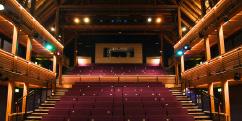






ECONOMICS
REQUIREMENTS:
Economics will challenge and develop key skills which will support your work in the subject and across your other subjects as well. The key skills we seek to develop include structured writing, research skills, prioritising information, analytical skills, evaluative skills, supporting arguments with data and evidence and making balanced judgements. You will be expected to read about Economics and think about Economics far beyond the classroom lessons.
A good grade at GCSE English and Maths will be a good starting point to develop these skills.
SUBJECT LEAD:
Grant Gallacher grantgallacher@frensham.org
EXAM BOARD: AQA
SPECIFICATION:
www.frensham.org/a-level-subjects
Do I have to be good at maths?
This is not maths - but you will work with numbers.
REASONS TO CHOOSE ECONOMICS:
To put it bluntly, why wouldn’t you?
If there ever has been a ‘right time’ to study Economics, it is now. The economic effects of huge change and uncertainty are all around us. Knowing how the world actually works can help you make sense of everything that is going on. Everyone in the world is connected to everyone else, at some level. What happens elsewhere affects you. What you do affects others. Economics will help you understand and appreciate the complexity of the modern world.
We will look at big, important issues such as BREXIT, the economic effects of the pandemic and the success of the government’s response to it.
We seek to answer questions such as:
Who was particularly badly affected economically by the pandemic? Did anyone gain? How can we improve the development of less developed countries? Who is the WTO? What is a Canada type deal? Why does a change in the value of the pound affect the economy? What causes inequality and what can we do about it? Should we be worried about deflation? What is money? These and many more huge questions lie at the heart of A-Level Economics.
However, there are smaller, yet just as fundamental questions to consider. Why do American drive though banks machines have braille dots on them?
Is the joy of finding £10 the same as the pain of losing £10? How can an understanding of tulip selling in Amsterdam show you the best way to auction a painting? What was the power of Angela Merkel’s shopping trolley? Who does have the upper hand in a football penalty shoot-out? Only A-Level Economics can answer these and many more questions like them.
Progression:
Look beyond A-Level Economics. Yes, it can lead you to study Economics at university. Many students do but look again at the key skills this subject develops. Then consider Law, Finance, International Relations, History, Psychology, Politics. The list is long and inviting. A-Level Economics will support you no matter what you want to study beyond Frensham.
ENGLISHLITERATURE
REQUIREMENTS:
Students should have achieved at least a Grade 6 in GCSE English Literature and English Language.
SUBJECT LEAD:
Samantha Stuart samanthastuart@frensham.org
EXAM BOARD: Eduqas (WJEC)
SPECIFICATION: www.frensham.org/a-level-subjects
REASONS TO CHOOSE ENGLISH LITERATURE:
Studying English Literature is all about developing an interest in and enjoyment of literature. It gives opportunities for reading widely and for making creative and informed responses to poetry, prose and drama. As a result, students learn how to think critically and question what they read. In addition, analysis of themes, characters and perspectives in texts will require them to define their own moral and ethical viewpoints.
This specification is based on a conviction that the study of Literature should encourage enjoyment of literary studies based on an informed personal response to a range of texts. It provides
learners with an introduction to the discipline of advanced literary studies and presents opportunities for reading widely and for making creative and informed responses to each of the major literary genres of poetry, prose and drama.
This specification offers three components in discrete genres of study: poetry, drama and prose to allow learners to focus on the conventions and traditions of each genre in turn. A further component offers unseen prose and poetry to allow learners to focus separately on applying the skills of literary analysis acquired during the course as a whole.
Course Components and Assessment:
1. Poetry - written examination - 30% of qualification
2. Drama - written examination - 30% of qualification
3. Unseen Texts - written examination - 20% of qualification
4. Prose Study - non-exam assessment - 20% of qualification
Studying English Literature opens up a world of inspiration and creativity, while also developing skills that are essential for today’s global environment. The skills you will acquire are: independent working, time management and organisation.
Career paths for English literature A-level students are varied and can include Media, Publishing, Accountancy, Medicine, Veterinary Medicine, Teaching, Advertising, Marketing, PR, Public Sector, Law and Politics.
FILM STUDIES
REQUIREMENTS:
Film Studies is a critical thinking subject with a significant written aspect. Accordingly a Grade 6 in both English Language and English Literature is required as a minimum entry requirement. 70% of this course is examined via essays. A strong performance at GCSE in History is welcome but not essential. Equally a strong performance in artistic subjects including photography may well be helpful with the practical option of the course if that is opted for.
SUBJECT LEAD:
Charlie Bennett charliebennett@frensham.org
EXAM BOARD: Eduqas (WJEC)
SPECIFICATION: www.frensham.org/a-level-subjects
REASONS TO CHOOSE FILM STUDIES:
Film Studies is a serious option that is recognized by the Russell group of Universities. However, if planning to study film or media at University students should not restrict their options to Russell group as there is a greater range of courses
beyond these 24 institutions.
It is readily combined at A-Level with a range of subjects: English Literature, History, Sociology, Politics, Photography, Design, Art, Fine Art, Music Tech, Drama or Psychology. At university Film Studies can be combined with many subjects as well as leading to a more focused film and media route.
The course has three main components:
1. Varieties of Film and Film Making 35% essays
2. Global Film-Making Perspectives 35% essays
3. Production 30% a screen play for a short film with a digital photographed storyboard and an evaluative analysis.
Film Studies would appeal to people who have good critical analysis skills and enjoy the visual medium. There are ranges of films that are studied, so an open mind to cinema beyond Hollywood is essential: from Classic Hollywood such as ‘Casablanca’ and ‘Vertigo’ to New Hollywood like ‘Alien’ and ‘One Flew Over the Cuckoos Nest’; American Film since 2012 such as Joker’ or ‘La La Land’ and ‘Captain Fantastic’ and British films such as ‘Shaun of the Dead’ and ‘Trainspotting’.
We’ll be studying the work of directors such as the Ridley Scott, Hitchcock, Danny Boyle and Edgar Wright. Concepts such as tone, genre, structure, character, dialogue and mis en scene will be explored.
Broader ideas like the signature of the auteur, the nature of spectatorship and different critical approaches will be analysed in depth.
In terms of Global Film, the cinema of Europe and beyond will be studied, for example, the Chinese film ‘House of Flying Daggers’ the Spanish film ‘Pan’s Labyrinth’ are some of the options available. Further areas of study include silent film, documentary for example Amy and experimental film such as Mulholland Drive.
In addition there is a practical element when there will be the opportunity to produce an original project. This is a short film screenplay of between 1600-1800 words.
This exciting opportunity to explore something new brings together a range of skills, passions and experiences for staff and students alike.

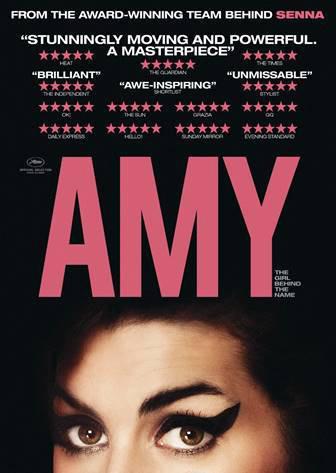

FINEART
REQUIREMENTS:
Students wishing to study Fine Art should have achieved a minimum of a Grade 6 in any Art & Design GCSE (eg Fine Art, Textiles, 3DD). Applicants without this should ideally have a portfolio interview with Brendan Horstead where they can show examples of work and be advised accordingly in relation to their suitability.
SUBJECT LEAD:
Brendan Horstead brendanhorstead@frensham.org
EXAM BOARD:
Eduqas (WJEC)
SPECIFICATION:
www.frensham.org/a-level-subjects
REASONS TO CHOOSE FINE ART:
The A-Level Fine Art course is designed to stimulate and challenge participants. They will develop their conceptual and imaginative approach to fine art practice, underpinned by practical making skills relevant to a diverse range of processes, employing a wide variety of materials and techniques.
A productive and purposeful engagement with the work of other artists, and broader contextual references and sources of inspiration, is key to developing a participant’s own practice. A willingness to approach the course with an open and enquiring mind is crucial. Responding to a sense of personal challenge informed by the ambition to make an individual and meaningful body of work is central to the course. We particularly value the creation of a positive and mutually supportive group dynamic between staff and students in the specialist A-Level studio, where all participants are allotted an individual space for use in lessons and when accessing the studios independently.
Course Components:
1. Personal Investigation, 60% of qualification, internally assessed, externally moderated.
2. Externally Set Assignment, 40% of qualification, internally assessed, externally moderated.

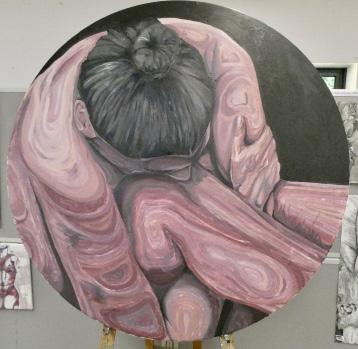




GEOGRAPHY
REQUIREMENTS:
Students should have a keen interest in the world and its challenges. While it is highly desirable to have taken Geography at GCSE, it is not absolutely essential.
SUBJECT LEAD:
James Bell jamesbell@frensham.org
EXAM BOARD: AQA
SPECIFICATION: www.frensham.org/a-level-subjects
REASONS TO CHOOSE
GEOGRAPHY:
Geography helps you to make sense of the world around you. It is very much a 21st Century subject enabling comprehension and understanding of a dynamic changing world. It is hands on, relevant and fun. Geography will help you get to grips with some of the big questions which affect our world and understand the social, economic and physical forces and processes which shape and change our world.
Geography equips students with an incredibly wide range of skills. Students learn how to conduct scientific research, use statistical methods, write essays, construct arguments and critically evaluate the situation around them. Fieldwork is a really important part of Geography and an excellent and enjoyable way to practise the skills learnt in class.
Geography is an excellent subject choice for students thinking about Law, Engineering, Journalism, Public Relations, Media Careers, Politics, Education, Healthcare and Finance. Students that have studied Geography at both A-Level and degree level are rapidly becoming some of the most sought after graduates around because of the huge range of skills that they possess, as well as the breadth of knowledge that they come with.
GRAPHICCOMMUNICATION
REQUIREMENTS:
Students wishing to study Graphic Communication should have achieved a minimum of a 6 Grade in any Art & Design GCSE (eg Fine Art, Textiles, 3DD).
Applicants without this should ideally have a portfolio interview with Brendan Horstead where they can show examples of work and be advised accordingly in relation to their suitability.
SUBJECT LEAD:
Brendan Horstead brendanhorstead@frensham.org
EXAM BOARD:
Eduqas (WJEC)
SPECIFICATION:
www.frensham.org/a-level-subjects
REASONS TO CHOOSE GRAPHIC COMMUNICATION:
Graphic Communication may be defined as the process by which information and ideas are communicated through the use of images, symbols, colours, shapes, patterns and typography.
The course will enable participants to develop conceptual and technical skills using a variety of media and processes, both digital and hand crafted.
Boundaries between related graphic processes are becoming increasingly blurred but aspects, such as Advertising, Packaging Design, print based Promotional Design and Illustration, Typography or Branding provide an indication of the types of projects, design briefs and self-identified assignments that may be completed.
Posters, brochures, flyers, T-shirts, CD/DVD sleeves, book covers, magazine spreads, calendars, stamps, packaging, publicity materials, vehicle livery, billboards, advertising, logos, branding, corporate identity, and three dimensional point-of-sale and exhibition design represent some of the range of product outcomes that may be produced.
A productive and purposeful engagement with the work of other designer, illustrators and artists, alongside broader contextual references and sources of inspiration, is key to developing a participant’s own work. A willingness to approach the course with an open and enquiring mind is crucial. Responding to a sense of personal challenge informed by the ambition to make an individual and meaningful body of work is central to the course. We particularly value the creation of a positive and mutually supportive group dynamic between staff and students in the specialist A-Level studio. Alongside Fine Art students, all participants are allotted an individual space for use in lessons and when accessing the studios independently. Although flexible in delivery, 3 of 5 lessons will be timetabled in the specialist Mac Suite.
Course Components:
1. Personal Investigation, 60% of qualification, internally assessed, externally moderated.
2. Externally Set Assignment, 40% of qualification, internally assessed, externally moderated.



HISTORY
REQUIREMENTS:
While it is desirable that you have achieved a least a Level 6 in GCSE History, we will welcome you even if you did not take the subject as long as you are enthusiastic and have a least Level 6 Grades in English and other humanities subjects. To be successful, you must have the ability to take careful notes, evaluate sources and write intelligent, well-constructed essays.
SUBJECT LEAD:
Matt Burns mattburns@frensham.org
EXAM BOARD: AQA
SPECIFICATION:
www.frensham.org/a-level-subjects
REASONS TO CHOOSE
HISTORY:
We all have an interest in some aspects of the past. You may be interested in the great personalities, the insight into human nature and achievement, or the failures, cruelty and barbarity of which human beings are capable.
If you have a sense of exploration and discovery then you will enjoy History – and if you enjoy it then the reading and the written work will not be a chore.
Course Components:
1. Breadth Study – Stuart Britain and the Crisis of Monarchy, 1603-1702
2. Depth Study – Revolution and Dictatorship: Russia and the Soviet Union, 1917-53
3. Historical Investigation – a completely free choice of topic based on a question that covers 100 years of history.
Course Assessments:
1. Written exam on Component 1 - 2 hours 30 minutes - two essays from a choice of three and one question linked to historical interpretations. 40% of A-Level.
2. Written exam on Component 2 - 2 hours 30 minutes - two essays from a choice of three and one question linked to primary sources. 40% of A-Level.
3. Historical investigation3500-4500 words - 20% of A-Level.
Next steps: Higher Education
History can be studied to advantage with almost any other subject. There seems to be no rule: each group of historians seems to contain students who between them are studying most other subjects. Many Science and Mathematics students also find that History broadens their intellectual approach, their research and writing skills and their options for the future. Universities and employers will be particularly interested in the skills you have acquired through the study of History. Your ability to construct arguments, evaluate different types of evidence, show initiative and produce balanced assessments will be invaluable later in life.
MATHEMATICS
REQUIREMENTS:
Maths is a sequential subject. Students will need to have at least a Grade 7 in GCSE Maths or equivalent to achieve at A-Level. To be successful, you must have the desire and tenacity to be able to solve multi-step questions.
EXAM BOARD: AQA
SUBJECT LEAD:
Chrissy Rose chrissyrose@frensham.org
SPECIFICATION: www.frensham.org/a-level-subjects
REASONS TO CHOOSE MATHEMATICS:
Throughout the two years, students will develop and extend their existing understanding of Algebraic manipulation and Trigonometry. Many students will be introduced to the aspects of Calculus and it’s applications for the first time, while diving into the world of exponentials and logarithms. Students will also discover for themselves, the links between the many different areas of Maths, and they will be introduced to the two applied areas of the A-level Maths course –Statistics and Mechanics.
Six great reasons to study Maths:
1. Maths is fun, exciting, wondrous and beautiful.
2. Career Opportunities - Maths and Further Maths are very versatile qualifications. They will naturally lead you into interesting, rewarding and well paid jobs.
3. Employability Skills - students with A-Level Maths/Further Maths are better at thinking logically and analytically.
4. Preparation for Higher Education - essential for STEM subjects.
5. Supporting Other SubjectsSciences, Geography, Psychology, Economics and Business Studies.
6. Interesting and Challenging Course - contains elements of Pure Mathematics, Mechanics, Statistics and Discrete Mathematics.
Course Assessments:
1. 100% Pure Maths - proof, Algebra and Functions, Coordinate Geometry, Sequences and Series, Trigonometry, Exponentials and Logarithms, Differentiation, Integration and Numerical Methods.
2. 50% Pure 50% Mechanics –Mechanics Element will include Vectors, Quantities and Units in Mechanics, Kinematics, Forces and Newton’s Laws And Moments.
3. 50% Pure 50% Statistics –Statistics Element will include Statistical Sampling, Data Presentation and Interpretation, Probability, Statistical Distributions and Hypothesis Testing.
FURTHER MATHEMATICS
REQUIREMENTS:
The Further Mathematics A-Level is a challenging extension of the Maths A-Level. It requires a Grade 8 or higher in GCSE Maths and it really is for students who really love Maths and can’t get enough of the subject - it’s probably someone thinking of continuing their Maths studies after Sixth Form or someone looking to study a Maths-based subject such as Maths, Engineering or Economics. Ideally, the Further Mathematics will be one of four A-Level choices; if it is taken as one of only three A-Levels, your choices are very top-heavy in Maths.
EXAM BOARD: AQA
SUBJECT LEAD:
Chrissy Rose chrissyrose@frensham.org
SPECIFICATION: www.frensham.org/a-level-subjects
REASONS TO CHOOSE FURTHER MATHEMATICS:
The Further Mathematics course is a challenging extension of the Maths A-Level; all pure Maths covered in the A-Level is extended with an introduction to complex
numbers, hyperbolic functions, polar coordinates and differential equations. Students get the choice of picking two out of three applied areas: Discrete – previously known as Decision Mathematics, Further Mechanics or Further Statistics.
A-Level Further Mathematics makes you stand out!
If you are a very strong mathematician and are passionate about the subject, Further Mathematics is for you. You are someone who really loves Maths and can’t get enough of it!
It is essential for a future degree course in Maths and desirable for a career in Economics.
Course Assessments:
1. 100% Further Pure – proof, complex numbers, matrices, further algebra and functions, further calculus, further vectors, polar coordinates, hyperbolic functions, differential equations and numerical methods
2. 100% Further Pure (as above)
3. 50% in each of the two Applied modules they choose (Further Statistics/Further Mechanics/ Discrete)
AS Further Mathematics
There is also an option to take Further Mathematics as an AS Level. This is the equivalent to half of an A-Level. Students will study the course with those who are studying the full A-Level and take the AS exam after the first year. This would be in addition to the Maths A-Level.
MODERN LANGUAGES
REQUIREMENTS:
Students must have achieved at least a Grade 6 in the relevant GCSE.
EXAM BOARD:
Pearson Edexcel
SUBJECT LEAD:
Valerie Taylor-Meysonnet valerietaylor-meysonnet@ frensham.org
SPECIFICATION: www.frensham.org/a-level-subjects
COURSE TOPICS:
• Changes in French and Spanish societies
• Political and artistic culture
• Multiculturalism
• WWII Occupation and Resistance in France, Franco’s dictatorship and transition towards democracy in Spain
Course Assessments:
Paper 1 - Listening, Reading and Translation - 2 hours (40%)
Paper 2 - Written Response to a film and a book and translation2h40 (30%)
Paper 3 - Speaking (Discussion on a theme and independent research project) - 25 mins (30%)
REASONS TO CHOOSE MODERN LANGUAGES:
French or Spanish
“A different language is a different vision of life.” - Federico Fellini
Modern Foreign Languages offer an exciting intellectual challenge as well as skills of practical value.
Language learning activates the grey cells in the brain. This not only improves general intelligence and memory, but it can also reduce the effects of brain ageing. Multilingualism also develops the following transferable skills highly sought after by employers in today’s global market:
• Effective oral and written communication
• Sophisticated cultural awareness and open-mindedness
• Independence and resilience when facing new challenges
• Observation and critical thinking
• Decision making and problem solving
By choosing to study a language, you will not only deepen your understanding of both the history and the cultures of our European neighbours but you will also become someone of real attraction to employers.
MUSIC
REQUIREMENTS:
You will need at least a Grade 6 in GCSE Music and a practical performance standard equivalent to at least Grade 5 at the beginning of the course. The ability to read and understand standard musical notation is essential for musical study at this level. It is expected that your performance ability will be equivalent to at least Grade 7 standard by the end of the course.
EXAM BOARD: AQA
SUBJECT LEAD: Laura Eaton lauraeaton@frensham.org
SPECIFICATION: www.frensham.org/a-level-subjects
REASONS TO CHOOSE MUSIC:
Students will deepen their understanding of Western Classical music through the study of set works prescribed by the Exam Board.
These include Baroque solo concertos, the operas of Mozart and Romantic piano music. In addition, students will learn about music drawn from two further areas of study of their choice, such as Pop Music, Music for Media, Music for Theatre or Art Music Since 1910.
There are ample formal and informal performance opportunities throughout the course. The A-Level assessment however is based on a single Year 13 recital of 10-12 minutes which may be either a solo or an ensemble performance, or a combination of the two.
Students will also complete two compositions with a combined duration of 4-5 minutes: one must be in response to a brief set by the Exam Board and the other will be a free composition.
CREATIVE MUSICINDUSTRY (RSL)
REQUIREMENTS:
Practical performance ability in voice and/or instrument. GCSE in Music not essential, but experience at using music production software is preferred, and an open mind and passion for music is essential.
EXAM BOARD: RSL
SUBJECT LEAD: Laura Eaton lauraeaton@frensham.org
SPECIFICATION: www.frensham.org/a-level-subjects
REASONS TO CHOOSE
CREATIVE MUSIC INDUSTRY
(RSL):
This modern approach to Music education integrates skills in music production, sound recording, composing and performance, and provides students with an excellent foundation for a career in the music industry. Students will develop their skills through practical projects, in which they will use our state-of-the-art equipment and purpose-built studio to apply the principles of the topic they are studying.
There are a diverse range of topics that students can opt to study, which include:
• live sound recording and studio sound recording
• mixing and mastering
• remixing and production
• use of effects and processors
• music video or podcast production
• rehearsing and performing music for various purposes
• live sound engineering
• music marketing
• composing and sequencing
Students evidence their progress through a combination of portfolio, presentation, and write-ups. They are assessed internally throughout each unit, and at the end of the course via external moderation.
QUALIFICATION:
Level 3 Extended Certificate in The Creative Music Industry.
PHILOSOPHY
REQUIREMENTS:
If you have studied GCSE Religious Studies: Grade 6 or above. If you have not studied Religious Studies GCSE: Grade 6 or above in either English Literature, History or other related Humanities subject.
EXAM BOARD: AQA
SUBJECT LEAD:
Flic Bains flicbains@frensham.org
SPECIFICATION: www.frensham.org/a-level-subjects
REASONS TO CHOOSE
PHILOSOPHY:
Do you really know anything, or do you just believe it to be true? Is there such a thing as the right action? Can you trust your senses? Is the mind the same as the brain? Do we have free will?
If you’ve ever found yourself asking these kinds of questions then Philosophy could be for you. Together we’ll explore some of life’s biggest and deepest questions, considering arguments proposed by some of the best and brightest minds including Aristotle, Plato, Philippa Foot, Kant, Mill,
Descartes, and Hume. You’ll develop important skills that are crucial for progression to higher education, such as the ability to be clear and precise in your thinking and writing. You’ll engage with complex texts, analysing and evaluating the arguments of others before constructing and defending your own arguments.
Lessons are mostly run in a seminar-style, and students are expected to participate actively in discussions. There will be reading, note-taking and writing involved too, but a willingness to listen respectfully to others, ask questions, and discuss ideas is crucial.
A level Philosophy is an antidote to just learning facts and figures: this subject requires you to think for yourself! If you have a critical but open mind, can think logically, like discussing, and enjoy writing, then Philosophy’s for you!
Course Content:
Epistemology: What is knowledge?
· The Tripartite View
· Perception as a source of knowledge (Direct Realism, Indirect Realism, Berkeley’s Idealism)
· Reason as a source of knowledge (Innatism, Intuition & Deduction)
· Limits of knowledge
Moral Philosophy: What is good?
· Normative Ethical Theories (Utilitarianism, Kantian Deontology, Aristotelian Virtue Ethics)
· Applied Ethics (Stealing; Simulated killing (video games, films etc.); Eating animals; Telling lies)
· Meta-Ethics (Moral realism, Moral anti-realism)
Metaphysics of God: What is God?
· Arguments for God (Ontological arguments, Teleological arguments, Cosmological arguments)
· Arguments against God (Problem of Evil)
· Religious Language
Metaphysics of Mind: What is the ‘Mind’?
· Dualism (Substance dualism, Property dualism)
· Physicalism (Identity theory, Eliminative materialism)
· Functionalism
Course Assessment:
2x 3hr written examinations, each worth 100 marks
For each unit (and therefore twice in each exam paper) you will produce:
· A descriptive 3-mark response
· Two explanatory 5-mark responses
· An explanatory 12-mark extended writing response
· An evaluative 25-mark essay
Where will Philosophy take me?
A Level Philosophy develops your skills of analysis, interpretation, evaluation, and communication. You will learn to write precisely and to argue logically, assessing the strengths and weaknesses of philosophical positions. In this respect Philosophy is a subject that compliments many other areas of study including Law, Politics,
History, Sociology, English, Biology, Chemistry, Physics, Maths and Music. It is a highly regarded and rigorous academic subject that will be of use to a wide range of careers including Journalism, Law, Medicine, Veterinary Science, Police work, Teaching and Public Relations.
PHOTOGRAPHY
REQUIREMENTS:
No specific qualifications are needed but it would help to have studied a creative subject or to have done some Photography previously. You need to have a genuine interest and a willingness for self-directed work in and outside of lessons. Entry onto the course is conditional on you having your own DSLR camera.
EXAM BOARD: Eduqas (WJEC)
SUBJECT LEAD: Sarah Farr
sarahfarr@frensham.org
SPECIFICATION: www.frensham.org/a-level-subjects
REASONS TO CHOOSE
PHOTOGRAPHY:
Are you creative, imaginative and have a willingness to learn? Do you enjoy exploring ideas and developing your understanding of the visual world, learning practical skills and responding to ideas and issues in ways that are personal to you.
Photography is about looking, learning, thinking and communicating ideas. It inspires creative thinkers. Photography means ‘drawing with light’ whether it be analogue or digital it is what photographers do when they capture an image.
Students will work mainly with digital cameras and work flow, however traditional darkroom facilities allow for extending experimentation opportunities.
Independent visits to exhibitions and galleries are an essential element of this course.
Course Components:
1. Personal Investigation, 60% of qualification, internally assessed, externally moderated.
2. Externally Set Assignment, 40% of qualification, internally assessed, externally moderated.
The Photography A-Level can lead to various further study and career opportunities:
Possible Degree Options: Animation, Commercial Photography, Creative and Editorial Photography, Digital Media, Fashion Photography,
Graphics with Photography, Medical or Forensic Photography and Visual Communication.
Possible Career Options:
Commercial Photography. Fashion Photography, Photojournalist, Digital Photo Editor, Social Photography and Sports Photography.





PHYSICALEDUCATION
REQUIREMENTS:
A Grade 6 or above in Double Science or Grade 6 in Biology if you have studied separate Sciences.
EXAM BOARD: AQA
SUBJECT LEAD: Phil Stanway phillipstanway@frensham.org
SPECIFICATION: www.frensham.org/a-level-subjects
REASONS TO CHOOSE
PHYSICAL EDUCATION:
You will need to have a real interest in sport and be prepared to be directly involved in the various sports played at Frensham. You will need to be confident in producing written work: two thirds of the qualification is internally assessed coursework, and one third is externally assessed (comprising two exams and a case study).
The PE A-Level allows students to play to their strengths and gain dynamic skills for further education and a healthy future.
It takes a multi-disciplinary approach encouraging the development of a range of methods. The course aims to provide greater knowledge, insight and understanding of human performances.
Do you have a high level of enthusiasm for sport in all its forms? Have you got a sound understanding of the theory aspects from GCSE PE/BTEC Sport? If so, this could be the course for you. This is a demanding course and a lot more time will be spent on theory aspects than the practical ones.
Course Assessment:
70% Theory/30% NEA
2 papers of 2 hours:
Paper 1:
Factors affecting participation in physical activity and sport: applied anatomy and physiology, skill acquisition, sport and society.
Paper 2:
Factors affecting optimal performance in physical activity and sport: exercise physiology and biomechanics, sport psychology, sport and society and technology in sport.
NEA:
Students will be assessed as a performer or coach in the full sided version of one activity. Plus verbal/ written analysis of performance, to be internally assessed and externally moderated.
PHYSICS
REQUIREMENTS:
Grade 7 or 6 in double or triple award science at GCSE is strongly recommended and a proven ability to deal with Physics problems is essential. Students who find Maths difficult invariably find Physics difficult too, so it is desirable for a student to be studying Maths at least to AS Level. You must also be able to think clearly and logically and the ability to write precise and concise answers is essential.
EXAM BOARD:
OCR
SUBJECT LEAD:
Kevin Joy kevinjoy@frensham.org
SPECIFICATION: www.frensham.org/a-level-subjects
REASONS TO CHOOSE
PHYSICS:
A-Level Physics is a challenging but worthwhile and rewarding subject to study. It will equip you with valuable life skills involving problem solving and a knowledge of topics ranging from Particle Physics to how the universe is put together.
A-Level Physics is an excellent
base for further study at university in a wide range of areas such as Medicine, Maths and Engineering. It is also a very useful course to study alongside Creative Arts, Languages and Humanities.
The problem solving skills gained over the two year course are invaluable in their application to a wide range of careers – not just science. Students with a good degree in Physics for example are keenly sought in area such as finance and politics for their excellent ability to solve complex problems with methodology.
Maths is the tool of the subject and ideally should be studied at A-Level alongside the Physics course. However, it is not necessary to take A-Level Maths, you just need the ability to do that level of maths.
Course Content:
1: Development Of Practical Skills In Physics
2: Foundations In Physics
3: Forces And Motion
4: Electrons, Waves And Photons
5: Newtonian World And Astrophysics
6: Particles And Medical Physics
Course Assessment:
Three written exams: Modelling Physics 37%
Exploring Physics 37%
Unifying Physics 26%
In addition to the written exams, there is a Practical Endorsement component which is continually assessed throughout the two year course.
POLITICS
REQUIREMENTS:
While it is desirable that you have achieved at least a Grade 6 in GCSE History, we will welcome you even if you did not take the subject as long as you are enthusiastic and have at least Grade 6 in English and other Humanities subjects. To be successful, you must have the ability to take careful notes, evaluate sources and write intelligent, well-constructed essays.
EXAM BOARD: Pearson Edexcel
SUBJECT LEAD: Charlie Bennett charliebennett@frensham.org
SPECIFICATION: www.frensham.org/a-level-subjects
REASONS TO CHOOSE POLITICS:
A-Level Politics explores three main ideas: British Government and Politics (covered in Year 12), Ideologies – including Socialism, Conservatism, Liberalism and Feminism; American Government and Politics.
This A-Level is both organic and vibrant: it is a subject that unfolds in real time. If TV programmes such as ‘Mock the Week’ ; ‘Have I Got News For You’; ‘Yes Minister’ as well as the news stimulate you, Politics might be for you. Politics is only offered at A-Level. It should appeal to people interested in debate and discussion; argument and analysis. It complements History and other Social Sciences. Like in History, work is examined using source analysis and essay writing. We will explore ideas as diverse as ‘Was Mrs Thatcher a Feminist?’ ‘What Should be in a Citizenship Test?’ ‘Should Britain Have a Written Constitution?’ ‘Democracy and Tyranny’ –‘Is the British Electoral System Flawed and Should it be Replaced?’ ‘Is the House of Lords an Outdated Institution?’ and a myriad of other ideas and questions. In addition this is recognized by Russell Group universities as a serious academic A-Level option.
PSYCHOLOGY
REQUIREMENTS:
At least Grade 6 in GCSE Combined Science, Maths and English are highly recommended.
EXAM BOARD: AQA
SUBJECT LEAD:
Paul Søgaard paulsogaard@frensham.org
SPECIFICATION:
www.frensham.org/a-level-subjects
REASONS TO CHOOSE PSYCHOLOGY:
Psychology is a diverse discipline, building on a wide range of skills. The scientific methodology involved in researching human behaviour allows students to gain a critical appreciation of scientific research, while the essay writing skills developed allow for elaborated analysis of research and concision in writing style.
Overview of Course Content:
First year:
• Social influence - study of conformity, obedience and social change.
• Memory - how it works, forgetting and eye witness testimony.
• Attachment - why relationships form, types of attachment and how it affects later life.
• Approaches in psychology - different schools of thought in psychology.
• Biopsychology - from neurons to brain functioning
• Psychopathology - mental illnesses including OCD, phobias and depression.
• Research methods - study of research design and key processes.
Second year:
• Schizophrenia
• Forensic Psychology
• Relationships
• Issues and debates
• Research methods (including statistical tests)
Why choose Psychology?
Psychology is the systematic study of the human mind and behaviour. Psychologists seek to produce and test theories to shed light on the processes and causes of human actions. We seek to answer contentious questions regarding human nature and nurture and to understand seemingly unexplainable human actions.
Psychology equips students with a wide range of skills and as such can lead to a diverse set of career options and further study: Marketing, business development, accountancy, human resources, forensic and clinical psychology, occupational therapy, nursing and teaching.
SOCIOLOGY
REQUIREMENTS:
You will need to be able to organise information into structured, reasoned answers to respond to challenging essay questions. You will need to be a clear and critical thinker, be someone who can construct an argument and able to write fluently. A good grade at GCSE English and ideally humanities subject (at least a 6) is essential.
EXAM BOARD: AQA
SUBJECT LEAD:
Paul Søgaard paulsogaard@frensham.org
SPECIFICATION: www.frensham.org/a-level-subjects
REASONS TO CHOOSE SOCIOLOGY:
Studying Sociology gives us an understanding of the society in which we live, how this shapes ideas, behaviour and culture and how people interacting together shape their communities. It is a living subject that helps us understand pressing contemporary issues such as diversity, identity, inequality and the structures that influence these. It will help you answer questions such
as why are men more likely to commit crime than women and how early childhood experiences shape the person you are.
Course components:
Paper 1. Education with Methods in Context:
Education - we examine the role of education, differences in achievement by class, gender, ethnicity, as well as looking at education in the global context. Methods in Context - applying research methods used in education to case material.
Research Methods: The design of the research used to obtain data from participants, including its strengths and limitations.
Paper 2. Families and Households
We explore changing patterns in and increasing diversity in family structure, gender roles and childhood.
Beliefs in Society - This topic looks at religious groups from world religions to cults and helps us understand the place of religious beliefs in society today and why many people are turning away from religion.
Paper 3. Crime and Deviance
A look at the many explanations for crime, considering ethnic, gender and class differences. We also consider the global and modern issues such as green crime and human rights crimes as well as crime control.
Studying Sociology at university can give you a whole host of exciting career options, including: Social Work, HR, Advertising, Policing, Marketing, Journalism, Law and Teaching.
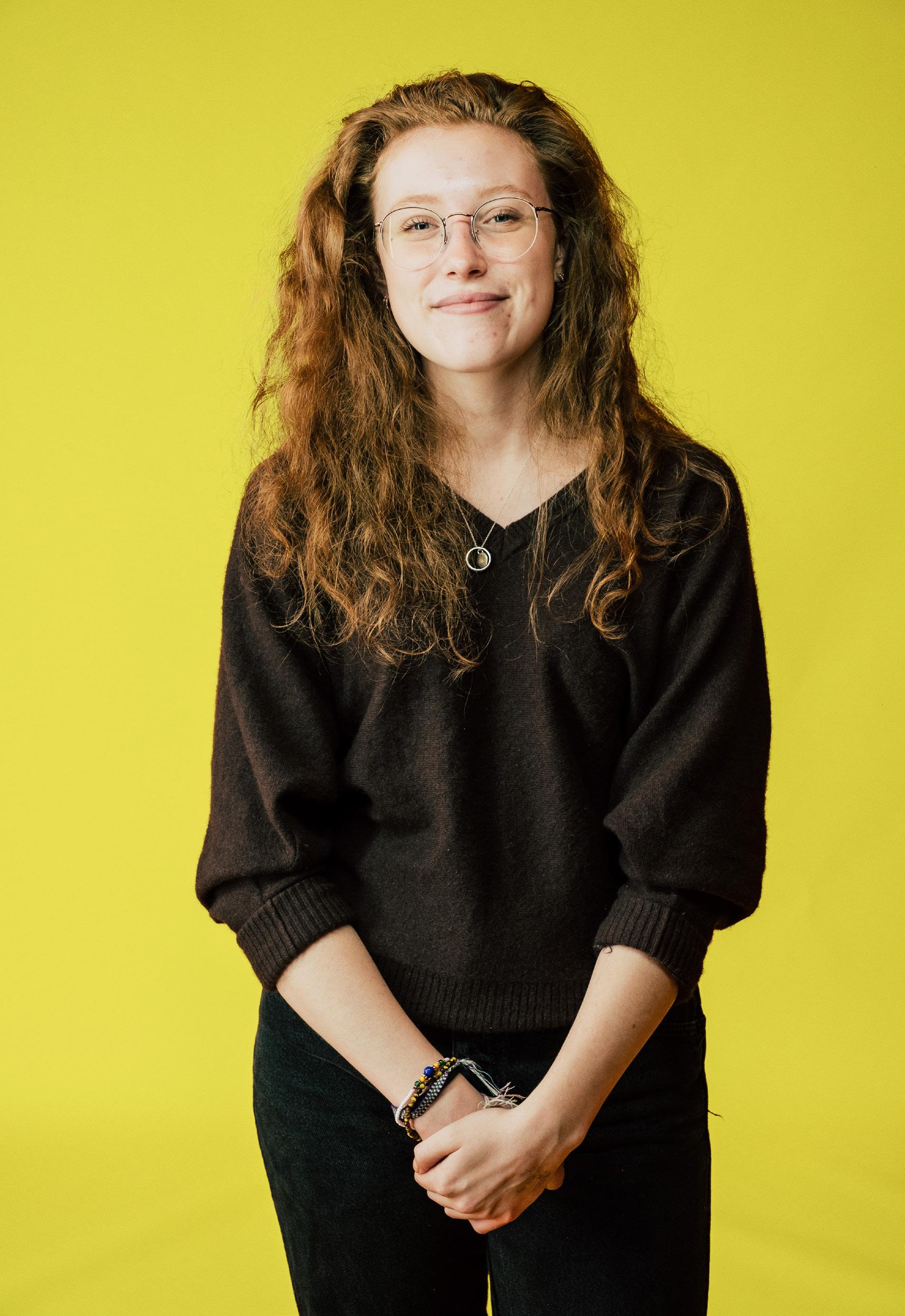
“AT FRENSHAM, YOU’RE LEARNING AND GROWING IN AN ENVIRONMENT WHERE YOU’RE GIVEN INDEPENDENCE, BUT IF YOU DO STUMBLE, IF YOU DO TRIP UP, YOU HAVE THE SUPPORT TO GET YOU BACK UP ON YOUR FEET.”
Sophie, Old Frenshamian
EXTENDED PROJECTQUALIFICATION
EXAM BOARD: OCR
SUBJECT LEAD:
Pippa Gaut
pippagaut@frensham.org
SPECIFICATION: www.frensham.org/a-level-subjects
WHAT IS AN EXTENDED PROJECT QUALIFICATION:
A 5000-word dissertation on a topic of your choice...or the creation of an artefact/production/ performance – with a 2000 word accompanying report (A-Level standard)
A journal that reflects your ninemonth ‘journey’
Two presentations (plus a brief Morning Talk!)
Some supporting and reflective paperwork (from the Exam Board)


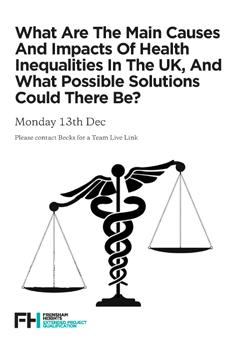
TRUE OR FALSE?
I can choose what I do for my extended project.
TRUE: but titles and projects need to be agreed and be ethically/ legally sound. It can be a dissertation or artefact; the more creative the better!
I will have an exam at the end of the year.
FALSE: you hand in a portfolio of evidence: your essay (or artefact), presentations, journal and supporting paperwork
I will develop important skills.
TRUE: some skills will be taught in your weekly session and include things like: project management, research, Excel, referencing, critical analysis and essay structuring. You will also need to demonstrate the independent learning of new skills that are appropriate to you and your project.


Universities do not recognise EPQs. FALSE: while getting your grades for your three main A-Levels is absolutely the most important thing, an EPQ will give you UCAS points equivalent to an AS Level (for those who are likely to apply to a course/college that is looking for a points total). It will also give you an opportunity to demonstrate super curricula interests in your chosen subject area, transferable skills that will help you transition to university style projects and research work.
STUDIESMATHEMATICAL
REQUIREMENTS:
Students must have achieved at least a Grade 4 or above in Maths.
EXAM BOARD:
AQA
SUBJECT LEAD:
Chrissy Rose chrissyrose@frensham.org
SPECIFICATION: www.frensham.org/a-level-subjects
REASONS TO CHOOSE
MATHEMATICAL STUDIES:
This is a Level 3 Certificate in Maths.
The specification has been designed to give students an opportunity to study Maths that can be applied to the real world. The course develops mathematical skills and thinking.
Compulsory content focusses on data, personal finance, estimation and critical analysis – topics that all students should have confidence and competence in.
It is equivalent to half an A-Level and with that in mind, it receives UCAS tariff points equivalent to an AS level. It requires 180 hours of study and can be delivered over one or two years.
THEEDGE
SUBJECT LEAD:
Alison Bundy alisonbundy@frensham.org
WHAT IS THE EDGE?
An exciting opportunity for Year 12 Students. In addition to the traditional A-Level subjects something new is being offered within the timetable – this means that, like your core subjects, this is mandatory. A selection of courses is being offered which will provide students the chance to expand their skill set or competencies from leadership to commercial awareness; from creativity to team work.
There are a wide range of courses available such as Cooking, Sport Leadership, First Aid and Theatre Lighting.
Each course is one period a week and will last five or ten weeks. There will be four of these five week blocks ending at Easter. At the end of the course the experience and the evidence of a broadening skill set will be logged on the ‘Unifrog’ online platform under Competencies. Most of the courses provide multiple competencies. This will provide students with the required ‘Edge’ when it comes to entering employment / Higher
EXPANDING HORIZONS
SUBJECT LEAD:
Jack Talman jacktalman@frensham.org
WHAT IS EXPANDING HORIZONS?
Expanding Horizons is a compulsory subject for all Sixth Formers at Frensham Heights. It’s a dynamic subject that gives students the opportunity to learn about and discuss what is happening in the world today, from global issues to those closer to home. This course has been created and is delivered predominantly by the Philosophy, Religion and Ethics Department with the specific aim to encourage students to think critically about society, to reflect on their own views, and to challenge each other. Ultimately, we aim to equip students with the skills and knowledge that they will need to play a full and active part in society.
Because Expanding Horizons reflects the changing world that we live in, the content is somewhat changeable and the topics that we study will vary year on year. However, there are some core topics (such as sexual and relationship health, and drugs and alcohol awareness) which we always cover to help to ensure that our students have the information and confidence that they need to keep
themselves and each other safe as they move into adulthood. For example, topics we have spent time exploring include; the Black Lives Matters protests, migration, and the cost of living crisis. One of the best things about this subject is its flexibility; we are able to spend time discussing the issues that students are genuinely interested in, and we welcome their feedback and input in choosing what we will study.
Through the Expanding Horizons programme, students are encouraged to challenge themselves and their own preconceptions. We encourage open, honest and respectful conversations, creating an environment where students can feel safe expressing their own beliefs, whilst also developing the confidence to debate with others. Lessons are discursive, with sessions being more likely to resemble a seminar than a lecture. Through a combination of supported independent research, small-group discussions, and whole-class debates, students develop a range of study skills, helping to prepare them for the world of work and further study in Higher Education.
SUBJECT CHOICES
These pages are to help you decide which subjects you would like to take.
An electronic form will be sent to you on Friday 31 January 2025, which is after the Year 11 Academic Parents’ Evening. This will allow you to submit your preferred subjects. You will need to select your subjects in order of preference, and include a reserve option as courses may not run if there is not enough interest.
If you wish to study Mathematical Studies or undertake an EPQ then please indicate this on the form under the Additional Studies section. If you would like to study four subjects then you will need to discuss this with Flic and Charlie: please email or Teams message them to arrange a time to meet.
Please note that the deadline for submissions is Friday 14th March, 2025.
3D Design /Product Design
Biology
Business
Chemistry
Computer Science
Dance
Drama & theatre Studies
Economics
English Literature
Film Studies
Fine Art
French
Geography
Graphic Communication
History
Mathematics
Further Mathematics
Music
Creative Music Industry (RSL)
Philosophy
Photography
Physical Education
Physics
Politics
Psychology
Sociology
Spanish
Additional Studies
EPQ
Mathematical Studies
AS Further Mathematics
Please note courses will only run if we have sufficient numbers.








